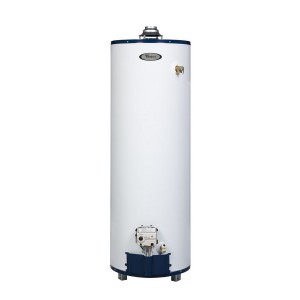
More U.S. households use natural gas to heat water than any other fuel source, and about 40% use electricity.A small percentage use propane or heating oil. Typical water heaters in the U.S. are electric resistance or atmospheric natural gas tank water heaters. Electric water heaters typically have Energy Factors (efficiency ratings) of about 0.9, while gas ones will be rated about 0.6.
The energy factor is based on site energy use, which is the amount of energy your water heater uses. However, it takes about three times as much source energy (this includes the energy needed to generate and distribute a fuel) to deliver a unit of electricity to the site as gas, since only about 1/3 of the fuel energy that enters the power plant reaches the house. The rest is lost due to inefficiency at the power plant and the power lines. Therefore, an electric water heater that appears to be 50% “better” than a gas one (0.9 Energy Factor versus 0.6 Energy Factor) actually uses much more source energy than the average gas water heater.
If you are looking to incorporate sustainable technologies into your home, a good place to start might be with your hot water heater. Because a conventional storage water heater constantly heats the water in the tank, energy can be wasted even when a hot water tap isn’t running in your home. The highest possible energy factor (EF) with the best of any conventional water heaters is 1. That means the amount of energy input is equal to the amount of energy transferred to the water in the tank. This hardly ever occurs, and rather than being transferred into the water, energy is lost in what is called standby heat loss. Standby heat loss can be corrected with a “gas water heater timer”.
There is a lot of good news, though. Manufacturers are bringing many kinds of advanced water heaters to the U.S. market, with much higher efficiency. The big news for electricity users is the Heat Pump Water Heater, which (like any other heat pump) takes energy from the air to heat water. At the same time, the heat pump water heater dehumidifies the air, saving the cost of buying and operating a separate dehumidifier. This is especially beneficial when the water heater is located in a basement and/or in a humid climate. Heat pump water heaters use one-third to one-half as much electricity as conventional electric water heaters.
For natural gas, many customers are choosing tankless or instantaneous water heaters. These are very compact, and generally wall-hung. Their rated efficiency is higher than that of tank units, and some units are Energy Star rated. However, the delivered efficiency gains may be somewhat more modest in typical home use (see table below). And, they can be very expensive to install in retrofit applications, requiring special ductwork and upsizing the gas lines. Condensing gas water heaters are a very promising new entry to the residential market. A condensing gas water heater works like a normal tank-type water heater, except that before the combustion gases are vented outside, the heat in those gases is captured and used to help heat the water in the tank.
In general, most choices available for natural gas are also sold for propane.
